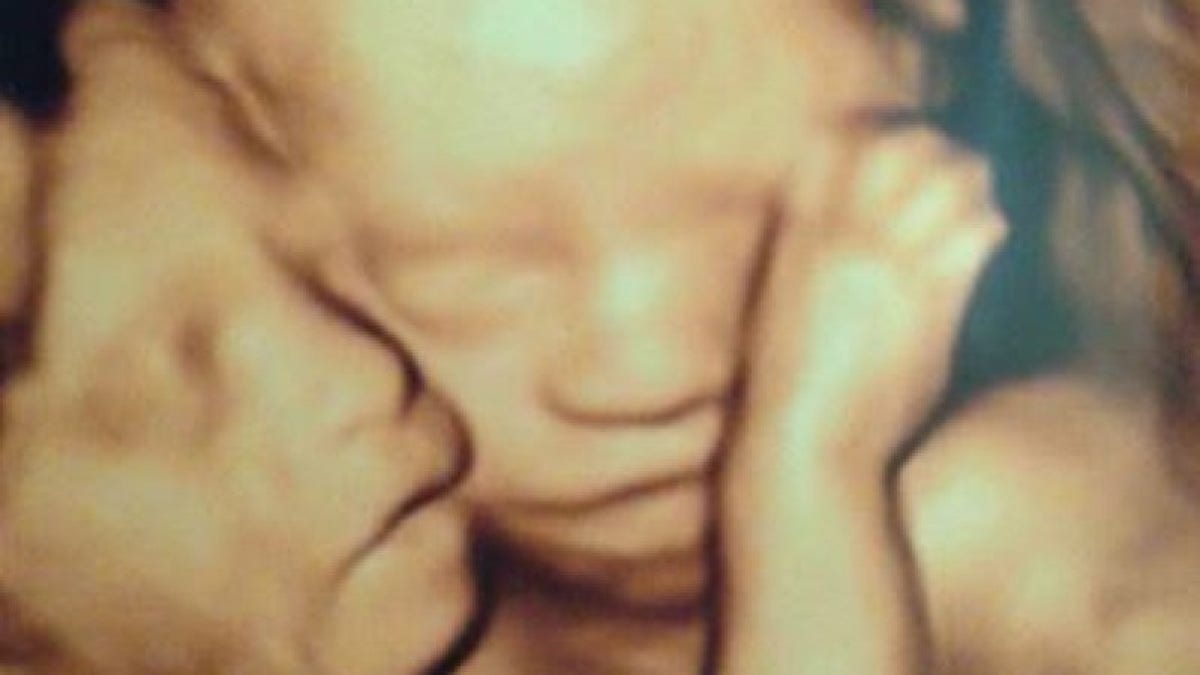
(GoFundMe)
A Minnesota mother is due to give birth to conjoined twins Wednesday, but only one of her daughters will survive, USA Today reported.
Amber McCullough, 31, a U.S. Army Reserves captain and attorney serving victims of domestic violence from Hastings, Minn., is a divorced single mother to a 6-year-old boy, Tristan. She will deliver her twin girls via caesarean section at 32 weeks gestation, but knows that no matter what, one of them will not make it.
Her daughters, Hannah and Olivia, are joined at the chest, stomach and hips and share an abdomen, liver and intestinal tract. They have individual hearts and kidneys.
After they’re delivered, the girls will be intubated immediately, at which point McCullough said she will be able to see them, briefly, then doctors will start the eight- to 12-hour separation surgery.
"If I had my way, I'd keep them together if they both could live," McCullough told USA Today. "But it's not possible. I wish it were. If they stay together, they'll both pass."
Olivia is not expected to survive because she only has a single ventricle and is missing valves; she also only has one leg and a congenital brain malformation. The future of Hannah, the healthier twin, is uncertain.
According to USA Today, conjoined twins occur once in every 200,000 births with 40 to 60 percent being stillborn and 35 percent surviving a single day.
McCullough learned that she was carrying conjoined twins during her second trimester. She went for several consultations at different hospitals that gave her conflicting opinions on whether or not to move forward with the pregnancy.
"I walked out of there thinking I must terminate out of my best interest, otherwise I'd likely be risking my life, and I have a 6-year-old to think of," McCullough told USA Today. "So far in this journey we have gone from OK, we can save both, we can save none, we can save one, and it's been a roller coaster."
McCullough has been under the care of the University of Minnesota Maternal-Fetal Medicine Center.
"It's a balancing act. What are the risks to mom in this pregnancy and what are the risks to baby or babies? This is a situation where Amber has known all along this is a risk to her own health, and we've been monitoring closely for that," Dr. Tracy Prosen, director of the Fetal Diagnosis and Treatment Center, told USA Today.
The twins are expected to be delivered at the Colorado Fetal Care Center at Children’s Hospital Colorado, one of the only centers in the world that performs a surgical separation while the babies are still attached to the mother’s placenta.
"So far we have been lucky," Prosen told USA Today. "But when we disconnect the umbilical cord, they will have to do a lot more for themselves that Amber is doing for them now and so that is going to be the big trial. The babies would likely fail rapidly after delivery so their best hope or Hannah's best hope would likely be for starting that separation procedure while still attached to the placenta."
McCullough has used a GoFundMe page to update followers on her pregnancy and while she has received criticism for her decision to move forward, pointed to the commitment she learned in her Army career.
"I will never quit. I will never accept defeat. I will never leave a fallen solider. Why don't my kids deserve that same kind of commitment?" she told USA Today. "I think it's very important their story be told. With my girls lies a message of life, strength, beauty."
Click to visit McCullough’s GoFundMe page.
